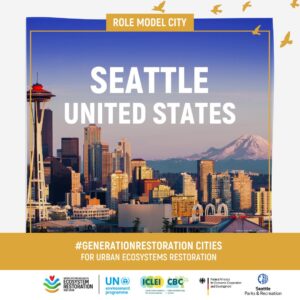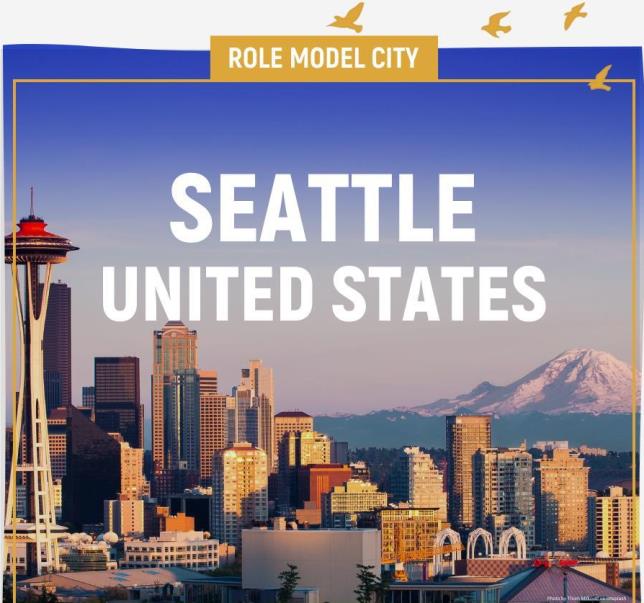On October 31, 2023, in recognition of the city’s efforts to support ecosystem restoration, the United Nations Environment Programme (UNEP) selected Seattle, Washington to participate in Generation Restoration, a collaborative initiative of the United Nations Decade on Ecosystem Restoration.
It took a couple of decades, but this is exactly the sort of activity first predicted in groundbreaking 2002 book, The Restoration Economy.
Following a stringent selection process, UNEP selected 19 cities to join the Generation Restoration project.
The restoration projects will contribute to filling the gap in Urban Ecosystems under the UN Decade on Ecosystem Restoration to achieve the Paris Agreement and the Global Biodiversity Framework.
Eight of the cities will implement pilot projects for ecosystem restoration in urban areas with financial support from UNEP and technical assistance from ICLEI – Local Governments for Sustainability, while 11 cities and mayors will act as restoration champions given their successful track-records in implementing nature-based solutions (NbS).
Urban areas occupy less than one per cent of the Earth’s land surface but house more than half its people. Yet, left unchecked, urbanization has devastating impacts on natural ecosystems, well beyond their geographic footprint and negatively affects the well-being of urban populations and their prospective resilience to climate impacts.
Adopting NbS at the urban level to protect, conserve and restore these degraded ecosystems, and mainstreaming greenery in urban planning is key to reconnecting cities with nature and mitigating the impact of climate change on urban communities.
“Embracing greener urban landscapes is a commitment to a more sustainable and resilient future for both citizens and the urban areas they occupy,” said Mirey Atallah, Head, Nature for Climate Branch, Ecosystems Division, UNEP.
“Generation Restoration is the beacon guiding cities towards harmony with nature. A number of model cities have demonstrated this. Resilient, thriving societies that coexist with the environment need to become the norm for a chance to achieve our collective targets,” she added.
Of the 250 applications from all over the world, Generation Restoration selected eight cities that will each receive grants of up to $100,000 USD for restoration work and to promote urban NbS.
- Douala in Cameroon will restore mangroves and set up governance structures with local communities to ensure their participation in the restoration and preservation of ecosystems.
- In Senegal, Dakar-Plateau and Thies will create a greenbelt and blue-green wedges around the metropolitan region to allow for species’ movement between protected areas in the city’s outskirts.
- Quezon City in Metro Manila, Philippines, will work with local communities and students to identify urban spaces in need of restoration, transform them, and design ecological corridors, green spaces and pollinator gardens.
- In India, the city of Kochi will undertake canal restoration to improve the water quality of the Vembanad Lake ecosystem, for the benefit of people and the entire basin.
- Sirajganj in Bangladesh will renature the city’s riverbanks by creating a green corridor that will rehabilitate, restore and enhance biodiversity around the river.
- The Ecuadorian canton of Samborondon will restore mangroves along the Daule and Babahoyo rivers. This activity will re-introduce local mangrove species, remove invasives, and restore natural habitats.
- Mexico City will strengthen citizen participation in promoting ecological restoration to help bring nature back into the urban environment.
- The Amazonian city of Manaus in Brazil will promote agroecology in urban and peri-urban areas to increase food security and reduce pressure on precious nearby forests.
“The city of Manaus is at the heart of the world’s largest rainforest and, like many other developing cities, faces several challenges brought about by urban growth and, for this reason, the chance to carry out a project to restore urban ecosystems in partnership with UNEP is a landmark for improving some of the city’s sanitation issues, boosting tree-planting to connect urban forest fragments and protect endangered endemic species, as well as preparing the city to tackle climate change,” said Pereira de Almeida, Mayor of the City of Manaus, Brazil.
These pilot cities will be followed and supported at every step of the way by Generation Restoration’s Champions of restoration: 11 Role Model cities across the globe, which are already leaders in preserving and enhancing natural ecosystems.
These Champions are Cape Town in South Africa, Iloilo in the Philippines, Kanawaza in Japan, Yangzhou in China, Curitiba in Brazil, Barranquilla in Colombia, Toronto in Canada, Seattle in the USA, Glasgow in Scotland, Istanbul in Türkiye and Paris in France.
These cities are at the front line of the socioeconomic impacts of climate change and ecosystem loss and have already taken ambitious action to protect and restore nature. They have shown that with adequate financing, planning and collaboration, restoring nature within cities is possible, and can lead to improvements in the quality of life, including mental health.
“Following the concept of green development, Yangzhou City practiced ecosystem conservation and restoration, cultivated ecological industries, constructed park-city, advocated low-carbon lifestyle, and strived to achieve a win-win situation among ecological, economic and social benefits,” said Guoqiang Pan, Major of Yangzhou City, China.
Seattle
Seattle, which will be a “role model city,” joins 18 other cities around the world seeking to share best practices to advance urban habitat. Seattle is the only city in the United States participating.
The Generation Restoration initiative is a two-year collaboration. As a role model city, Seattle will highlight urban forest restoration efforts such as the Green Seattle Partnership as well as other initiatives to preserve natural areas and enhance ecosystem health throughout nearly 500 parks.
 “From planting the next generation of our urban tree canopy to improving habitat for juvenile salmon, the City of Seattle is committed to renewing and protecting our natural areas so they can continue to benefit our communities,” said Mayor Bruce Harrell.
“From planting the next generation of our urban tree canopy to improving habitat for juvenile salmon, the City of Seattle is committed to renewing and protecting our natural areas so they can continue to benefit our communities,” said Mayor Bruce Harrell.
“As a city with vast stretches of shoreline and lush green spaces, we have a unique obligation to restore these ecosystems that are critical to our wellbeing, economy, biodiversity, and resilience to the impacts of climate change. We are excited to join the Generation Restoration initiative and look forward to learning from other environmental leaders around the globe to build the healthy, sustainable, and climate-forward future we want to see here in Seattle,” he added.
Mirey Atallah, Head, Nature for Climate Branch, Ecosystems Division, UNEP, celebrated this initiative by saying, “Embracing nature-based solutions in our urban landscapes is a commitment to a greener, more sustainable future for both citizens and the urban areas they occupy. Generation Restoration is the guiding light for cities as they endeavor to harmonize with nature, constructing resilient and thriving communities that coexist harmoniously with the environment.”
“Seattle is known as the Emerald City for its resplendent beauty and natural environment. Our parks and recreation system which encompasses approximately 500 parks and over 6,000 acres is a key part of what makes Seattle a model city for urban regeneration and environmental stewardship,” said AP Diaz, Seattle Parks and Recreation Superintendent.
“Our residents value healthy and thriving ecosystems and have dedicated decades of time and resources to ensure biodiversity thrives in our community, which is why I’m extremely proud these efforts are now being recognized internationally. The City of Seattle is proud to join the 18 other world cites and to be recognized as the only U.S. City to share our best practices and learn from others on how to restore ecosystems in our urban spaces,” he continued.
Ecosystem restoration is key to avoiding global climate catastrophe. Such efforts also support climate mitigation, climate adaptation, economy, food security, water supplies, health, and biodiversity.
The United States has committed to restoring 15 million hectares of ecosystems this decade as part of the UN Decade on Ecosystem Restoration.
This recognition comes as the city is accelerating investments and partnerships to equitably expand and maintain Seattle’s urban forest, as well as improve tree health and reduce disparities in human health outcomes and heat island effects.
In September, Seattle was awarded $12.9 million by the U.S. Forest Service to plant trees, create green careers for young people, and restore forested places near schools, parks, and low-income housing. The grant will build on the long history of the Green Seattle Partnership to restore forested parklands, which are threatened by invasive species and the challenges of climate change.
Earlier this year, Seattle was among the first Washington cities to sign onto a new statewide tree equity collaborative and pledged to plant more than 8,000 trees over the next five years on public and private properties and 40,000 trees in parks and natural areas.
Mayor Harrell also issued the One Seattle Tree Plan Executive Order in April directing City Departments to accelerate efforts to expand tree canopy on public land and updated the City’s Tree Ordinance to increase tree protections and provide for more equitable distribution of tree canopy.
To bolster these efforts, Mayor Harrell’s 2024 proposed budget includes funding to expand the Trees for Neighborhoods program to 1,300 trees planted in 2024 and evaluate siting a One Seattle Tree Nursery to grow trees locally.
“Trees, outdoor spaces, native plants and fresh water are not just vital for a healthy and connected ecosystem, they build climate resilience, security, and wellbeing within our own communities here in Seattle,” said Jessyn Farrell, Director of the Seattle Office of Sustainability & Environment.
“As Seattle works to achieve 30% canopy cover, the trees we plant today, and efforts we take to improve our urban habitat, will create the urban forest of tomorrow, where future generations can share in equitable access to nature, green spaces, and shade,” she added.
Seattle has also been working on habitat restoration on the Cedar River in partnership with the King County Department of Natural Resources.
“Neighbors in our local community join our organization in making our park an amazing place for birds and other wildlife,” said Joey Manson, Director, Seward Park Audubon Center. “They bring their family and friends, ready to get dirty and work up a sweat to preserve and protect our environment. In the process, they grow community connections through their shared appreciation and stewardship of this old-growth forest that is part of their neighborhood.”
In April, the two agencies completed the Riverbend project, restoring a nearly mile-long segment of the Cedar River to a more natural state and improving salmon habitat and reducing flood risks for people, homes, and infrastructure.
“As a contributing organization with the Green Seattle Partnership, Partner in Employment is thrilled to see our collective efforts to care for the forests, wetlands, creeks, and shorelines recognized internationally by the United Nations,” said Abidrahman Omar, Program Director of Partner in Employment.
“Partner in Employment has created an opportunity where refugee and immigrant youth can participate in the stewardship of environmental restoration programs. This work is critical for all our neighbors as we strive to protect and preserve the natural environment for current and future generations. Our commitment to safeguarding these vital ecosystems supports a range of important goals, such as: promoting biodiversity and conserving endangered species, helping maintain the delicate balance of our local ecosystems. We are honored to be part of this global recognition and remain dedicated to our mission of environmental stewardship. Together, we can continue to make a positive impact on our local environment and contribute to global sustainability efforts,” he explained.
This recognition illustrates how Seattle is seen as a leader in sustainability initiatives not just nationally, but globally as well.
Seattle is also a part of the C40 Cities Urban Nature Declaration collaboration, has signed on to the International Migratory Bird Treaty, as well as the Paris Climate Accords. Joining the Generation Restoration effort with the UNEP continues this commitment to global sustainability efforts by the City of Seattle.

